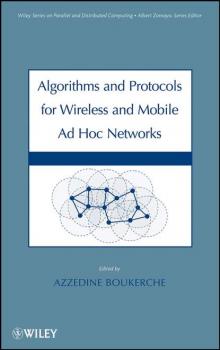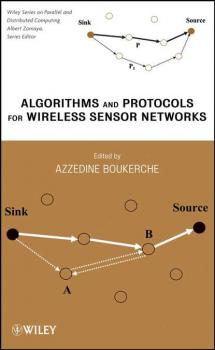ТОП просматриваемых книг сайта:
Azzedine Boukerche
Список книг автора Azzedine BoukercheАннотация
Learn the fundamental algorithms and protocols for wireless and mobile ad hoc networks Advances in wireless networking and mobile communication technologies, coupled with the proliferation of portable computers, have led to development efforts for wireless and mobile ad hoc networks. This book focuses on several aspects of wireless ad hoc networks, particularly algorithmic methods and distributed computing with mobility and computation capabilities. It covers everything readers need to build a foundation for the design of future mobile ad hoc networks: Establishing an efficient communication infrastructure Robustness control for network-wide broadcast The taxonomy of routing algorithms Adaptive backbone multicast routing The effect of inference on routing Routing protocols in intermittently connected mobile ad hoc networks and delay tolerant networks Transport layer protocols ACK-thinning techniques for TCP in MANETs Power control protocols Power saving in solar powered WLAN mesh networks Reputation and trust-based systems Vehicular ad hoc networks Cluster interconnection in 802.15.4 beacon enabled networks The book is complemented with a set of exercises that challenge readers to test their understanding of the material. Algorithms and Protocols for Wireless and Mobile Ad Hoc Networks is appropriate as a self-study guide for electrical engineers, computer engineers, network engineers, and computer science specialists. It also serves as a valuable supplemental textbook in computer science, electrical engineering, and network engineering courses at the advanced undergraduate and graduate levels.
Аннотация
A one-stop resource for the use of algorithms and protocols in wireless sensor networks From an established international researcher in the field, this edited volume provides readers with comprehensive coverage of the fundamental algorithms and protocols for wireless sensor networks. It identifies the research that needs to be conducted on a number of levels to design and assess the deployment of wireless sensor networks, and provides an in-depth analysis of the development of the next generation of heterogeneous wireless sensor networks. Divided into nineteen succinct chapters, the book covers: mobility management and resource allocation algorithms; communication models; energy and power consumption algorithms; performance modeling and simulation; authentication and reputation mechanisms; algorithms for wireless sensor and mesh networks; and algorithm methods for pervasive and ubiquitous computing; among other topics. Complete with a set of challenging exercises, this book is a valuable resource for electrical engineers, computer engineers, network engineers, and computer science specialists. Useful for instructors and students alike, Algorithms and Protocols for Wireless Sensor Networks is an ideal textbook for advanced undergraduate and graduate courses in computer science, electrical engineering,and network engineering.


